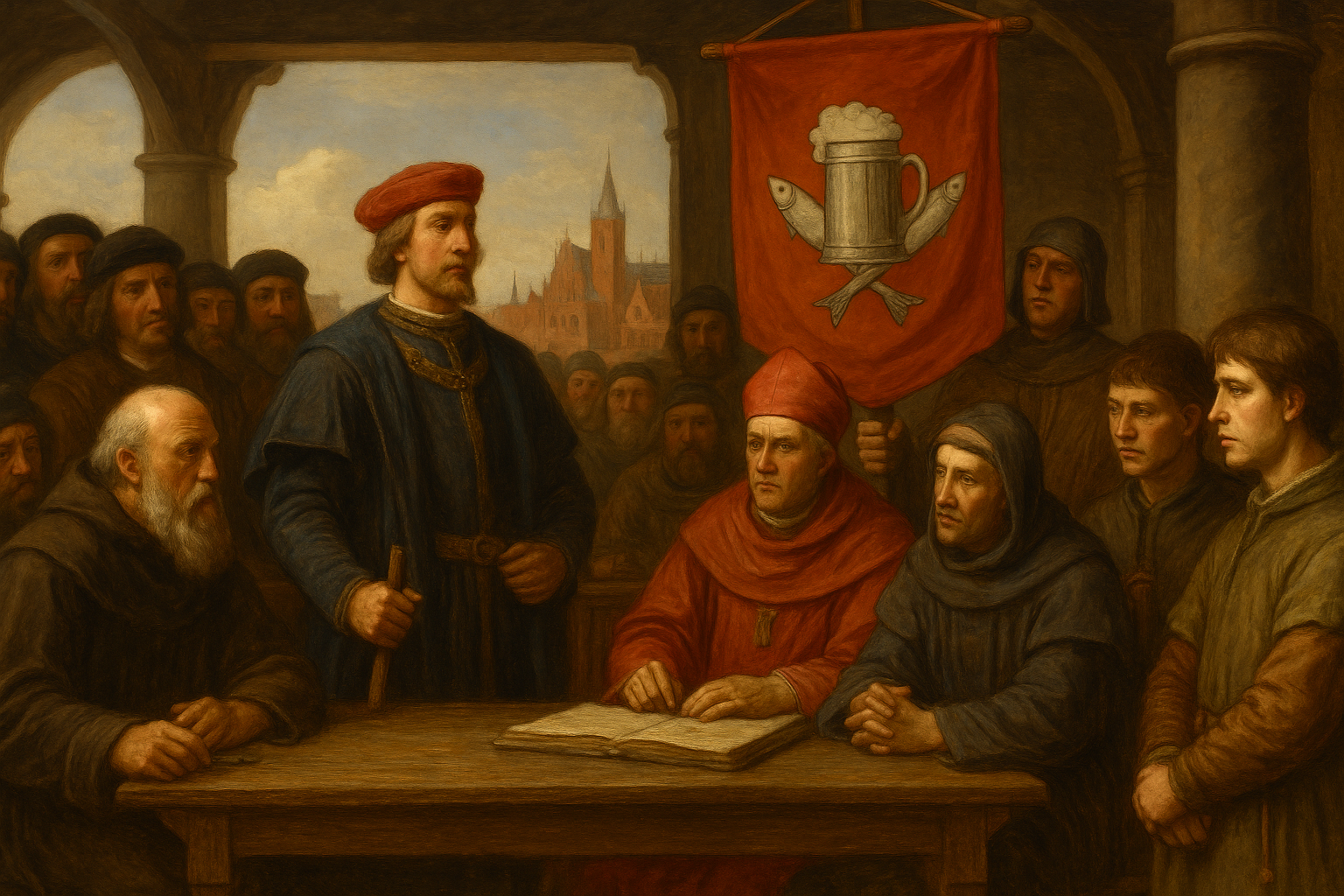Conversations on Science, Culture and Time

Lowly Fruit, Lofty Consequences
In this sixth instalment of Tales from the Cloister, we return to Brother Percival himself - older, warier, and determined to keep out of trouble. Unfortunately, a bumper apple harvest, a few cracked bottles, and the arrival of a very important guest conspire against his better intentions. What begins as a harmless cider soon threatens to unearth old heresies, test ecclesiastical diplomacy, and remind us all why fermentation is a dangerous form of theology.

The Hanseatic Cask: On Commerce, Confusion, and a Porter Best Left Buried
It is a curious fact that the Hanseatic Charter of 1356 bears a faint watermark, not of ink or wax, but of aged gruit. No one dares explain why the parchment smells faintly of smoked barley and myrrh.
According to the marginalia of one particularly nervous monastic scribe, the events leading to the formation of the League began not with diplomacy or merchant acumen, but with the unexpected arrival of a weathered barrel — mislabelled, unsealed, and entirely out of place.
The barrel in question, retrieved from the hold of a Danish supply vessel anchored in Lübeck harbour, bore no name beyond a fading tag: “Monastic – Not for Lay Consumption – Property of P.” Naturally, the dockhands opened it within the hour.

Fewer Visions, More Malt: A Letter from Brother Cadfael
Shrewsbury Abbey Feast of St. Benedict, in the Year of Our Lord 1264
Brother Percival,
Peace and (tentative) good health be upon you.
Your most recent delivery — a curious flagon bearing no seal but reeking faintly of yarrow and unconfessed sin — arrived two nights past. It was found by Brother Jerome outside the apothecary, nestled inexplicably in a wheelbarrow of turnips.

The Yarrow Brew of 1263 – Found Parchment
Translated from a parchment found behind the apothecary wall, sealed with wax and inexplicably covered in honey.
Inventory Entry – Brew Log
Date: Feast of Saint Gall, 1263
Brewer: Brother Percival (unsupervised)
Purpose: "To invigorate the brethren ahead of winter. Also, curiosity."
Ingredients:
Yarrow (generous handful) – "stimulates the mind, allegedly"
Wild nettle – "for body and penance"
Heather flowers – "smells nice, Sister Magdalen approves"
Barley malt – "basic decency"
Small amount of wormwood – "just a whisper"
Fermentation via spontaneous prayer (see note)

Recovered Monastic Notes on the Wormwood Incident
The Wormwood Incident, Anno Domini 1257
"It is hereby recorded that on the evening of the Wormwood Experiment, Brother Percival did, with good intent but questionable wisdom, infuse his latest brew with the bitter herb of absinthe. This was done under the belief that it would ‘purge sin from the body and ‘enhance theological clarity.’ It instead led to:
Brother Eustace spontaneously composing a Latin hymn of no known origin (translation attempts are ongoing, as half of it appears to be angelic gibberish).

The Brew That Nearly Sparked a Reformation
Brother Percival had long accepted that solitude was both a gift and a hazard. It was a gift, granting him silent communion with the Almighty; a hazard, because the mind, when left alone too long, tended to wander into weird territories. Some monks, in their idle hours, took to copying sacred texts or gardening. Brother Percival, however, had taken to brewing.
In theory, it all started innocently. A small experiment here, a slight refinement there. The other brothers at the monastery appreciated a hearty ale, and if the Church insisted on monopolizing hops, well, one had to get creative. There were other ways—unconventional ways—to craft a drink not just potent, but utterly memorable. Yet as Percival stared at his latest batch, a faintly luminescent brew bubbling away in his candlelit chamber, he found himself muttering, “I may have gone too far this time.”
